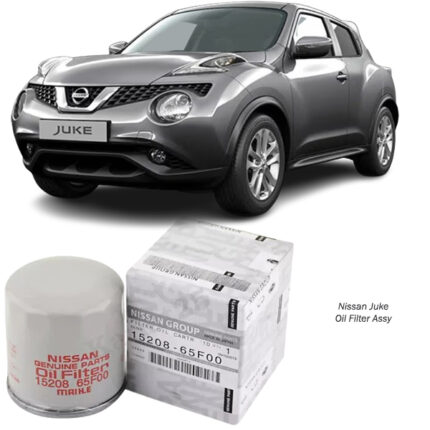-20%
Get Toyota Genuine Oil filter 04152-37010
The oil filter is a crucial component of a vehicle’s lubrication system, responsible for removing contaminants and impurities from the engine oil. This ensures that clean oil circulates through the engine, promoting smooth operation, longevity, and optimal performance. This article explores the functions, types, importance, and maintenance of oil filters in vehicles.
Functions of an Oil Filter
- Contaminant Removal: The primary function of an oil filter is to trap and remove contaminants from the engine oil. These contaminants include dirt, metal particles, carbon deposits, and sludge that can accumulate over time and adversely affect engine performance.
- Protection: By removing contaminants, the oil filter helps protect critical engine components such as bearings, pistons, cylinder walls, and camshafts from premature wear and damage. Clean oil ensures proper lubrication and reduces friction within the engine.
- Maintaining Oil Quality: An oil filter contributes to maintaining the quality and viscosity of the engine oil. Clean oil performs better in lubricating and cooling the engine, which is crucial for efficient operation and fuel economy.
- Extended Engine Life: Regularly changing the oil filter along with engine oil helps extend the life of the engine. By keeping the oil clean and free of contaminants, the oil filter supports optimal engine performance and reliability over time.
Types of Oil Filters
- Mechanical (Spin-on) Oil Filters: These are the most common type of oil filters found in vehicles. They consist of a metal canister housing with a filter element inside. As oil flows through the filter element, contaminants are trapped while clean oil passes through and returns to the engine.
- Cartridge Oil Filters: Cartridge filters separate the filter element from the housing. The filter element is replaced separately from the housing during maintenance. This design allows for easier recycling of the filter element and reduces waste.
- Magnetic Oil Filters: Some oil filters include a magnetic element that attracts and captures metallic particles suspended in the oil. This helps extend the life of the oil filter and provides additional protection against engine wear.
- Synthetic (Microglass) Oil Filters: These filters use a synthetic microglass fiber material for the filter element. Microglass filters are capable of trapping smaller particles and provide superior filtration efficiency compared to traditional cellulose filter elements.
Importance of Regular Oil Filter Maintenance
- Optimal Engine Performance: Regularly replacing the oil filter ensures that the engine receives clean oil, which is essential for maintaining optimal performance, responsiveness, and fuel efficiency.
- Engine Protection: A clean oil filter prevents contaminants from circulating through the engine and causing damage to critical components. This protection extends the lifespan of the engine and reduces the risk of costly repairs.
- Maintaining Warranty Coverage: Following the manufacturer’s recommended oil and filter change intervals helps maintain warranty coverage for the engine and related components. Failure to adhere to these intervals could void warranty protection.
- Environmental Impact: Proper disposal and recycling of used oil filters help minimize environmental impact. Many oil filters contain recyclable materials, and recycling them ensures that hazardous waste is handled responsibly.
Signs of a Worn or Failing Oil Filter
- Poor Oil Pressure: A clogged or worn-out oil filter can restrict oil flow, leading to low oil pressure. Low oil pressure may trigger warning lights on the dashboard or cause engine components to operate inefficiently.
- Noisy Engine Operation: Insufficient lubrication due to a clogged oil filter can result in increased engine noise, such as ticking or tapping sounds. This indicates that engine components are not adequately lubricated.
- Dirty or Dark Oil: During an oil change, inspect the condition of the old oil. If the oil appears dirty, gritty, or dark in color, it may indicate that the oil filter is not effectively removing contaminants.
- Engine Overheating: In extreme cases, a severely clogged oil filter can lead to engine overheating. Without proper lubrication and cooling, engine components may overheat and suffer damage.
Oil Filter Maintenance and Replacement
- Regular Inspection: Check the condition of the oil filter during each oil change. Look for signs of damage, leaks, or excessive buildup of contaminants.
- Replace at Recommended Intervals: Follow the manufacturer’s recommended oil and filter change intervals specified in the owner’s manual. This interval varies depending on driving conditions and environmental factors.
- Use High-Quality Filters: Choose high-quality oil filters that meet or exceed OEM specifications. Quality filters offer better filtration efficiency and durability, providing superior protection for the engine.
- Proper Installation: Ensure the oil filter is installed correctly according to the manufacturer’s instructions. Apply a thin coat of clean engine oil to the filter gasket before installation to ensure a proper seal.
- Dispose of Used Filters Properly: Dispose of used oil filters responsibly by recycling them at designated collection centers or facilities. Many automotive service shops and recycling centers accept used oil filters for proper disposal.
Follow us on Facebook for more parts.



